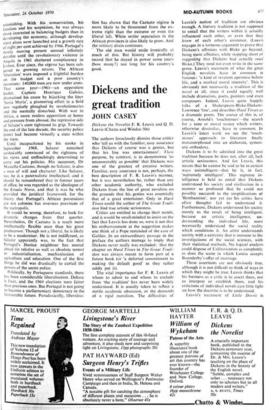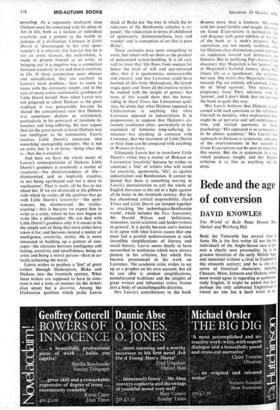Dickens and the great tradition
JOHN CASEY
Dickens the Novelist F. R. Leavis and Q. D. Leavis (Chatto and Windus 50s)
The authors ferociously dismiss those critics who 'tell us with the familiar, easy assurance that Dickens of course was a genius, but that his line was entertainment'. Their purpose, by contrast-, is to demonstrate 'as unanswerably as possible' that Dickens was one of the greatest of creative writers. Familiar, easy assurance is not, perhaps, the best description of F. R. Leavis's manner, but it was nevertheless he, rather than any other academic authority, who excluded Dickens from the line of great novelists on the grounds that his genius was essentially that of a great entertainer. Only in Hard Times could the author of The Great Tradi- tion find true artistic seriousness.
Critics are entitled to change their minds, and it would be small-minded to insist on the fact that Leavis has done so, were it not that his embarrassment at the suggestion makes one think of a Pope reminded of the case of Galileo. In an extraordinary passage in the preface the authors manage to imply that Dickens never really was excluded : that the chapter on Hard Times in The Great Tradi- tion was always meant to form part of a future book (or 'a deferred commitment to making the default good' as they rather oddly put it).
The vital importance for F. R. Leavis of whom to admit to and whom to exclude from 'the tradition' has never been widely understood. It is usually taken to reflect a sterile academic obsession, or the demands of a rigid moralism. The difficulties of
Leavis's notion of tradition are obvious enough. A literary tradition is not supposed to entail that the writers within it actually influenced each other, or even that they knew of each other's existence. (Leavis engages in a tortuous argument to prove that Dickens's affinities with Blake go beyond, being mere affinities, while stopping short of suggesting that Dickens had actually read Blake.) They need not even write in the same genre. Leavis's statement of what the great English novelists have in common is famous: 'a kind of reverent openness before life, and a marked moral intensity'. This is obviously not necessarily a tradition of the novel at all, since it could equally well include dramatists, poets, painters and even composers. Indeed. Leavis quite happily talks of a Shakespeare-Blake-Dickens- Lawrence 'line, and describes Hard Times as a dramatic poem. The source of this is, of course, Arnold's 'touchstones'—the search for a tone or moral stance which writers. otherwise dissimilar, have in common. In Leavis's latest work we see the 'touch- stones' approach • to literature finally metamorphosed into an elaborate, system- atic orthodoxy.
Dickens is to be admitted into the great tradition because he does not, after all, lack artistic seriousness. And for Leavis, this means that he cannot be said to be in certain ways unintelligent—that he is, in fact, 'supremely intelligent'. This supreme in- telligence is held to entail that Dickens understood his society and civilisation in a manner so profound that he could not possibly succumb to the simplifications of 'Benthamism', nor yet (as his critics have often thought) fail to understand it. Furthermore, Dickens understood his society merely as the result of being intelligent, because an artistic intelligence, un- derstanding the individual life, must necessarily understand the social reality which conditions it. An artist understands society with a certainty that is immune to the investigations of the social sciences, with their statistical methods. No logical analysis could dispose of Utilitarianism as completely as does the scene in which Louisa accepts Bounderby's offer of marriage.
These assertions are not obviously true, although it is not difficult to think of ways in which they might be true. Leavis thinks that his business as a critic is to assert them, not to interpret or establish them, and his criticisms of individual novels cast little light on how the doctrine is to be understood.
Leavis's treatment of Little Dorrit is
revealing. As a supremely intelligent man Dickens must be concerned with the place of Art in life, both as a feature of individual - creativity and a pointer to the health or sickness of a civilisation. Clennam in Little Dorrit is 'discouraged in his vital spon- taneity'; it is relevant (for Leavis) that he is not an artist. Gowan, the arch-nihilist, is made to present himself as an artist, so bringing out in a negative way a connection between creativity in art and moral creativity in life. If these connections seem obscure and metaphysical, they are ancillary to Leavis's main problem: how to come to terms with the extremely simple, and in the eyes of many critics sentimental, goodness of Little Dorrit herself. Now when Leavis was not prepared to admit Dickens to the great tradition it was presumably because he shared the conventional view that Dickens was sometimes shallow or sentimental, particularly in his portrayal of feminine in- nocence and long-suffering. He now argues that (in the great novels at least) Dickens was too intelligent to be sentimental. Leavis resolves Little Dorrit's innocence into something manageably complex. She is not an artist, but 'it is in being—being what she is—that she is creative'.
And here we have the whole secret of Leavis's reinterpretation of Dickens. Little Dorrit's goodness is essentially a matter of creativity—`the disinterestedness of life— disinterested and so implicitly creative, in not being ego-bound and not a slave to mechanism'. That is really all he has to say about her. If we are dismayed at the glibness with which he rattles off the qualities that go with Little Don-it's 'creativity'—`the spon- taneous, the disinterested, the reality- creating'—this is because we expect him to write as a critic, where he has now begun to write like a philosopher. He can deal with Little Dorrit's goodness only if it ceases to be the simple sort of thing that most critics have taken it for, and becomes instead a matter of intelligence, creativity, reality. He is more interested in building up a pattern of con- cepts—the relations between intelligence and feeling, creativity and unselfishness, being an artist and.being a moral person—than in ac- tually criticising the novel.
Leavis wishes to produce a 'line' of great writers through Shakespeare, Blake and Dickens into the twentieth century. What these writers are supposed to have in com- mon is not a tone, or manner (in the Arnol- dian sense) but a doctrine. Among the Dickensian qualities which make Leavis think of Blake are 'the way in which the ir- relevance of the Benthamite calculus is ex- posed', 'the vindication in terms of childhood of spontaneity, disinterestedness, love and wonder' and 'a conception of art that is pure Blake'.
These analogies may seem compelling to some, but others will see them as the product of determined system-building."It is all very well to insist that 'life flows from sources far below the level of will and ego-enforced idea; that it is spontaneous, unmeasurable and creative' and that Lawrence could have learned all this from Shakespeare, the Greek tragic poets and 'from all the creative writers he studied with the insight of genius'; but none of this would show that the horse- riding in Hard Times has Lawrentian qual- ities, let alone that what Dickens opposed to Utilitarianism is anything like what Lawrence opposed to industrialism. It is preposterous to suppose that Dickens's ex- tremely traditional ethic—particularly in his treatment of feminine long-suffering in. nocence—has anything in common with Lawrence, that the treatment of Little Dorrit or Sissy Jupe can be compared with anything in Women in Love.
Ultimately Leavis has to transform Little Dorrit's virtue into a matter of Blakean or Lawrentian 'creativity' because he wishes to construct a 'line' of writers who will stand for creativity, spontaneity, 'life', as against industrialism and Benthamism. It cannot be denied that there is something moving in Leavis's determination to call the whole of English literature to his aid in a fight against all he hates in the twentieth century. But he has abandoned critical responsibility. Hard. Times and Little Dorrit are lumped together as attacking 'the technologico-Benthamite world', which includes the New Statesman, Mr Harold Wilson and 'politicians, statesmen, social-scientists and leader-writers in general'. It is partly because one's instinct is to agree with what Leavis means that one must feel a painful embarrassment at such incredible simplifications of literary and social history. Leavis seems finally to have succumbed to tendencies which were always present in his criticism, but which first became pronounced in his work on Lawrence. The academic critic wishes to set up as a prophet on his own account, but all he can offer is strident simplifications, manufactured traditions and the insights of great writers and influential critics frozen into a body of unchallengeable doctrine.
Mrs Leavis's contributions to the book
deserve more than a footnote. She writes with her usual fertility and insight. Her essay on Great Expectations is particularly fine and disposes with great subtlety of the view of the book as 'a snob's progress'. pip's aspirations are' not merely snobbish, since for Dickens class distinctions could represent an aspiration toward real distinction and fineness. But in justifying Pip's horror at the discovery that Magwitch is his 'patron', and at Magwitch's harmful fantasy about Pip's future life as a 'gentleman', she overstates her case. She insists that Magwitch's feelings towards Pip are entirely self-centred, a mat- ter of 'blind egotism'. This removes all poignancy from Pip's relations with his `patron', and I don't think that we can read the book in quite this way.
Mrs Leavis believes that Dickens is con- cerned with such questions as the relation of free-will to heredity, what explanation there might be of perverse and self-stultifying ac- tion, and related questions in moral psychology. 'His approach is so systematic as to be almost academic.' Mrs Leavis's own approach to Dickens is systematic, and some of the overstatements in her account of Great Expectations can be seen to stem from this source. But she is systematic in a way which produces insight, and her Dickens criticism is as fine as anything she has done.















































 Previous page
Previous page